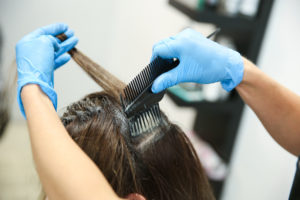
More than 65,000 American women are expected to be diagnosed with uterine cancer this year. It is the most common female gynecologic cancer, and women older than 55 are especially likely to develop it. Obesity, hormonal imbalances, and a family history of cancer can all increase the chance of uterine cancer. Recent findings revealed another potential risk factor: chemical hair straighteners. A study from the National Institutes of Health (NIH) found that women who use chemical hair straighteners may be at a higher risk of developing uterine cancer. In response, women diagnosed with uterine cancer after using chemical straighteners are suing the beauty companies that marketed the products as safe.
Unlike breast and cervical cancer, there’s no routine screening test for uterine cancer. If someone doesn’t have symptoms, they likely won’t know they have the disease. Women who use hair straightening products like relaxers should know uterine cancer symptoms. The NIH study found that women who used hair straightening products more than four times a year were 2.5 times more likely to develop uterine cancer. It’s not clear why these hair products can increase the risk of cancer, but they do contain several chemicals that can be carcinogenic. Additionally, hair straightening chemicals can enter the bloodstream if there are any cuts or burns on the scalp.
Some demographics are more likely to be diagnosed with uterine cancer. Hair straightening products are popular among Black women, who comprise 60% of the consumer base. Latina women also frequently use hair straightening chemicals. Both groups have seen rising rates of uterine cancer. One study found that Hispanic women of reproductive age were diagnosed with uterine cancer at a rate 49% higher than white women. Black women are commonly diagnosed with advanced, harder-to-treat forms of uterine cancer and are the demographic most likely to die from the condition.
There are two types of uterine cancer: endometrial cancer, the most common type and easier to treat, and uterine sarcoma, which is aggressive and extremely rare. Catching the disease early lessens the chances of cancer spreading and improves a patient’s prognosis. Uterine cancer is typically diagnosed via endometrial biopsy or ultrasound. Treatment options vary depending on the severity of the cancer. Some women will recover after surgery to remove the uterus, while others will need chemotherapy and radiation treatment. Because there’s no routine screening test for uterine cancer, women must educate themselves on the signs and tell their doctors if they experience any symptoms.
Uterine Cancer Symptoms
If you’ve frequently used hair straightener products in the past or regularly use them now, you need to know the warning signs of uterine cancer. The symptoms are often confused with other gynecological conditions that aren’t serious, so it’s crucial to alert your doctor if you have any of the below symptoms so that they screen you for uterine cancer.
- Abnormal bleeding. Vaginal bleeding after menopause or between periods isn’t normal and needs to be discussed with a medical professional. Heavy and prolonged bleeding can also be indicators that something is wrong.
- Pelvic pain. If you experience pain, cramping, or pressure in your pelvic region under your belly button, it could be a sign of something serious. In some cases, uterine cancer will cause constant pain. In other instances, the pain may happen sporadically.
- Weight loss. Losing weight without trying can happen for many reasons — stress is a common contributor. But it’s also common in cancer patients. The disease can disrupt hormones and cause someone to feel less hungry than usual, and cancer cells can cause the body to burn more calories.
If you have these symptoms, it’s essential to call your doctor and let them know — and to tell them about your use of hair straightening products. You may not have uterine cancer, but scheduling an examination just in case is essential. Your doctor may also decide to monitor your symptoms even if tests come back negative.
A uterine cancer diagnosis can be devastating. Even when the disease is caught early, treatment options are often painful and invasive. And knowing that a product you thought was safe might have increased your risk of developing cancer is difficult to comprehend. Talking to a lawyer after your uterine cancer diagnosis should be a priority. With legal representation, you can seek compensation for medical bills, the wages lost during your time away from work, and overall pain and suffering from the companies that manufacture hair straightener products. Contact D’Arcy Johnson Day attorney Jessica Ramirez, who specializes in serious personal injury and product liability litigation, today at 866-327-2952 or visit us online for a free hair straightening cancer case consultation.

From sexual abuse matters to personal injury and workers compensation, Jessica brings a wealth of experience to her practice at D’Arcy Johnson Day. Her fluency in both English and Spanish enables her to help so many members of the community, as she focuses on accident and personal injury cases, work injuries, medical malpractice, immigration, criminal law, and municipal court proceedings among other areas of practice.














Comments for this article are closed.